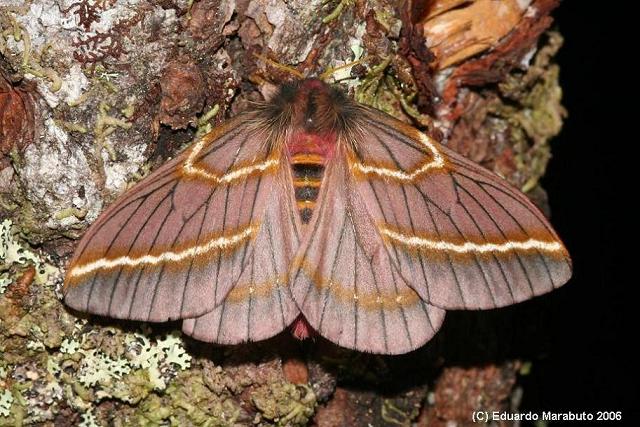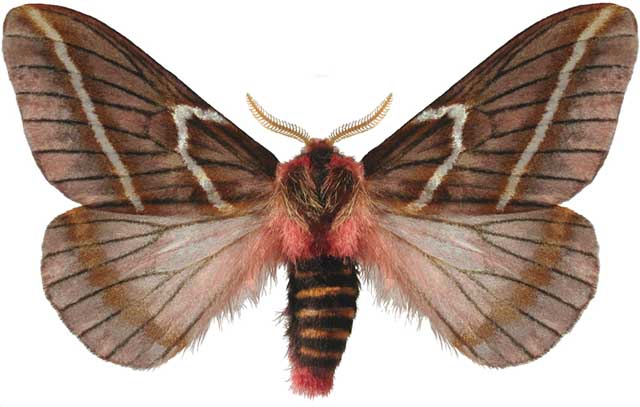Paradirphia rectilineata
|
|
Updated as per Lemaire's Hemileucinae 2002, July 16, 2006, May 2007
Updated as per personal communication with Ronald D. Cave (Honduras), July 2007
|
Paradirphia rectilineata
pah-ruh-DIRF-ee-uhMrek-tih-LIN-nee-ay-tuh
Wolfe, 1994

Paradirphia rectilineata female, Honduras, courtesy of
Eduardo Marabuto
TAXONOMY:
Superfamily: Bombycoidea, Latreille, 1802
Family: Saturniidae, Boisduval, [1837] 1834
Subfamily: Hemileucinae, Grote & Robinson, 1866
Tribe: Hemileucinae, Grote & Robinson, 1866
Genus: Paradirphia Michener, 1949
|
MIDI MUSIC
"Someone to Watch
Over Me"
copyright C. Odenkirk
MIDI CITY
ON.OFF
<bgsound src="watch.mid" LOOP=FOREVER>
|
DISTRIBUTION:
Paradirphia rectilineata
(wingspan: males: 53-55mm; females: 61-65mm) flies in
Honduras: Cortes, Ocotopeque, Francisco
Morazan (CL), Cortés, Francisco Morazán, Intibucá (Ronald D. Cave),
probably Lempira, Comayagua and Yoro; and
El Salvador: Santa Ana, Metapan; at
moderate elevation in cloud forests (1950-2150m).

Paradirphia rectilineata male, Honduras, courtesy of Ronald D. Cave.
FLIGHT TIMES AND PREFERRED FOOD PLANTS:
Specimens have been taken in July and August.
Larvae feed on Prunus.
ECLOSION, SCENTING AND MATING:Females extend a scent gland from the tip of the abdomen, and the night-flying males pick up and track the airbourne pheromone
plume with their well-developed antennae.

Paradirphia rectilineata PT female, P N Montecristo, Metapan, El Salvador,
July 27, 1994, Claude Lemaire, on my home computer only.
EGGS, LARVAE, COCOONS AND PUPAE:Eggs are deposited in clusters on hostplant foliage.
Paradirphia rectilineata larvae are highly gregarious and have the urticating spines typical of larvae from the Subfamily Hemileucinae.
Larval Food Plants
It is hoped that this alphabetical listing followed by the common name of the foodplant will prove useful. The list is not exhaustive.
Experimenting with closely related foodplants is worthwhile.
Use your browser "Back" button to return to the previous page.
Return to Paradirphia Genus
Return to Mexican and Central American Saturniidae Directory
Return to Main WLSS Index


